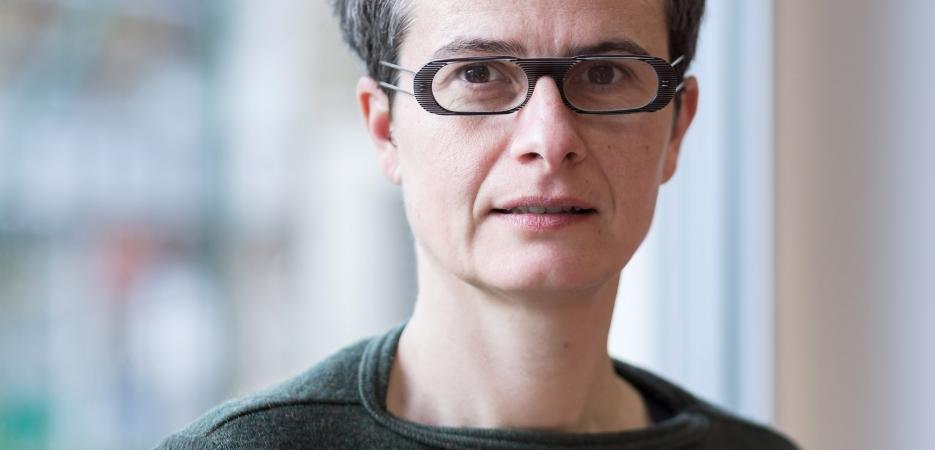
Elsa Vivant
Professor of Urban Studies
March - April 2023

- Social Sciences and Humanities
- Boston
“If you see an overdose, don’t run.”
I am a city planner and a sociologist, and I teach urban studies at the Paris School of Urban Planning. My early research on the relationship between art and urban design led to a critical analysis of the role of culture in urban dynamics and the reshaping of metropolitan territories. In parallel, I studied the representation of urban planning (i.e. action on space) in contemporary creation. In recent years, I have collaborated with artists on projects related to my research, and I am currently reflecting on aesthetics in the social sciences. How can we design forms that allow for discussion of them?
After a first collaboration with a theater company at Maison des Métallos, in Paris, on a project that brought together local residents and patients at a mental health facility, I redirected my research toward spatial issues in the care industry.
“If you see an overdose, don’t run. Call 911. You’re protected by law.”
When I arrived in Boston, in 2018, I was intrigued by that message, printed on official posters. Without knowing where it would lead, I began an investigation among parents whose children had died of an overdose, police officers, doctors, local councilors, activists in favor of Drug Consumption Rooms, and local residents.
Elsa Vivant is a professor of urban studies and the director of Latts (CNRS-ENPC-Université Gustave Eiffel). She was a guest researcher at the London School of Economics at King’s College, and at Berkeley and Harvard universities. She took part in the program of Experimentation in Art and Politics at Sciences-Po in Paris, and was a guest artist and researcher at guest artist and researcher at the Ateliers Médicis in Clichy-sous-Bois, near Paris. She has published over thirty articles in international academic journals. Her first social science novel, L’Impasse : scènes de l’urbanisme ordinaire, was published by Créaphis in 2021.
For a documentary film, Recovery Island, she will visit places where drug users receive care but are socially excluded, and she will meet the people who are working to put an end to the drug overdose epidemic.
Recovery Island, my first documentary film, explores the way our view of drug users is constructed through the spatialization of care in addictology, which reinforces stigmatization by isolating them in remote places (Long Island, MA), or socially excluding them (the New Market industrial district). The spatialization of these care services has a strong visual dimension. The gaze is drawn to the dilapidation, inhospitality, and remoteness of the sites. In New Market or off the coast of Long Island, one feels physically separated from the drug users by an insurmountable obstacle, whether it’s an urban boulevard or the sea. It is a very cinematic impression of distancing which, together with media images of drug users, contributes to a sense of otherness.
My film shifts the gaze, offering a different take on the representation of drug practices and users. How can we face up to a problem we don’t want to see? How can we show the problem to help people understand it, without becoming voyeuristic? How can we avoid limiting the gaze to what it has learned to observe and see? How can we avoid reproducing, through representation, existing prejudice and stigmatization? How can we give voice to the under-represented? The film takes the time to listen to different viewpoints and subjectivities, while immersing viewers in the places it traverses in order to convey a sense of distance, of the complexity of the situation. Exploring different social and geographical spaces and listening to divergent voices, the film confronts the gap between a hidden reality and the way it is rendered socially visible, gradually progressing from a depiction of the opioid problem in the public sphere to enter private spaces impacted by this personal and family tragedy.
The opioid crisis is often presented as a symbol of the decline of the white working class. Yet Boston is hard hit, with over 250 deaths from overdose every year, despite being a wealthy, cosmopolitan, and intellectual city, and a hotspot for biomedical research. Since 2014, the problems related to drug use in the public space have centered on the New Market industrial district, with a concentration of services targeting homeless people and/or drug users (jails, probation services, methadone clinics, shelters, etc.).
Due to its peripheral location and an isolation exacerbated by a concentration of services for vulnerable people, the New Market neighborhood has become an island in the city, cut off by the highway infrastructure, with a degraded environment (a storage and recycling industrial site). The project title also refers to Boston City Council’s plan to create a campus for addictology care on an island off the city’s coast.
This form of relegation of an undesirable population, intended as a future solution to a current problem, recalls the ancient, conservative practices of distancing and confining the unwanted on islands, even though such practices have shown their limits. But these places of exclusion also foster a sense of belonging, allowing communities of users to develop. Recovery Island compares the social and moral assignments of drug users with the spatial assignment of the care dispensed to them (in what is often a coercive and infantilizing way).
In partnership with

Laboratoire Techniques Territoires et Sociétés (LATTS)
LATTS is a multidisciplinary research center in the humanities and social sciences, specializing in cities and territories, public action and work. Based on the observation that technical worlds are of particular and growing importance in spatial, societal, economic, and political transformations, it focuses on understanding how infrastructures and technical devices are shaped by the various social worlds in which they are inserted and, conversely, how they contribute to transforming them. Through numerous field surveys, the work carried out within the laboratory has a triple ambition: to practice a demanding interdisciplinarity, to affirm the principle of a solid empirical support for research, and to encourage debate and theoretical production. As a joint research center, the LATTS brings together researchers and professors from the CNRS, the Ecole des Ponts ParisTech and the Gustave Eiffel University.



